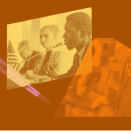Targeted Killing
The ACLU works in courts, legislatures, and communities to defend and preserve the individual rights and liberties that the Constitution and the laws of the United States guarantee everyone in this country.

The Latest
-


Families of Trinidadian Men Killed in Illegal Boat Strike Sue Trump Administration
-


New Poll Shows Voters Overwhelmingly Support Public Accountability for U.S. Boat Strikes
-


Rights Groups Sue Trump Administration for Legal Justification of Deadly Boat Strikes
-


ACLU Statement on Two Year Anniversary of Kabul Drone Strike
Explore More
What's at Stake
The U.S. targeted killing program operates without meaningful oversight outside the executive branch, and essential details about the program still remain secret, including what criteria the government uses to put people on CIA and military kill lists as well as how much evidence is required before it does so.
The U.S. Constitution and international law prohibit the use of lethal force outside of armed conflict zones unless it is used as a last resort against a concrete, specific, and imminent threat of grave harm. Even in the context of an armed conflict against an armed group, the U.S. government may use lethal force only against individuals who are directly participating in hostilities against the United States. Regardless of the context, whenever the government uses lethal force, it must take all possible steps to avoid harming civilian bystanders. But these are not the standards that the executive branch is using.
The United States continues to carry out unlawful targeted killings in Pakistan, Somalia, Yemen, and elsewhere. The government must be held to account when it carries out such killings in violation of the Constitution and international law. The ACLU has litigated numerous lawsuits and regularly advocates with Congress and the executive branch in order to press for accountability and transparency surrounding the program.
The U.S. targeted killing program operates without meaningful oversight outside the executive branch, and essential details about the program still remain secret, including what criteria the government uses to put people on CIA and military kill lists as well as how much evidence is required before it does so.
The U.S. Constitution and international law prohibit the use of lethal force outside of armed conflict zones unless it is used as a last resort against a concrete, specific, and imminent threat of grave harm. Even in the context of an armed conflict against an armed group, the U.S. government may use lethal force only against individuals who are directly participating in hostilities against the United States. Regardless of the context, whenever the government uses lethal force, it must take all possible steps to avoid harming civilian bystanders. But these are not the standards that the executive branch is using.
The United States continues to carry out unlawful targeted killings in Pakistan, Somalia, Yemen, and elsewhere. The government must be held to account when it carries out such killings in violation of the Constitution and international law. The ACLU has litigated numerous lawsuits and regularly advocates with Congress and the executive branch in order to press for accountability and transparency surrounding the program.